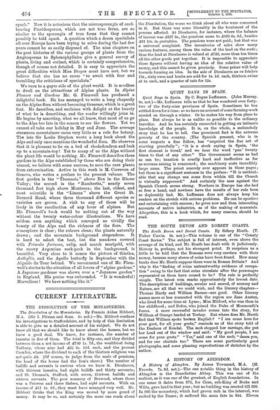QUIET DAYS IN SPAIN.
Quiet Days in Spain. By C. Bogue Luffmann. (John Murray. 8s. net.)—Mr. Luffmann tells us that he has wandered over forty- two of the forty-nine provinces of Spain. Sometimes he has settled down for a time : so we have an account of some farming-work carried on through a winter. Or he makes his way from place to place. But always he is as nnlilre as possible to the ordinary traveller. And he has certainly succeeded in getting an intimate knowledge of the people. It is, on the whole, a melancholy story that he has to tell. One prominent fact is the extreme poverty of the country. LThe Spanish peasant, who is in some respects a fine fellow, has "acquired the fine art of starving gracefully" ; "it is a stock saying in Spain, the first element is bread,' and we hear the word 'pan' twenty times to that of any other." The Government seems as bad as can be; taxation is cruelly hard and ineffective as far as revenue raising is concerned ; the machinery costs incredibly largo sums. The priest scarcely ever appears in these pages ; but there is a significant sentence in the preface: "It is unthink- able that any change can come from within till the Church is virtually suppressed." And certainly the case against the Spanish Church seems strong. Nowhere in Europe has she had so free a hand, and nowhere have the results of her rule been so deplorably bad. Mr. Luffmann does not always keep his readers on the stretch with serious problems. He can be sportive and entertaining with success; he gives now and then interesting accounts of native industries, as of the making of muscatels. Altogether, this is a, book which, for many reasons, should be read.


























































 Previous page
Previous page